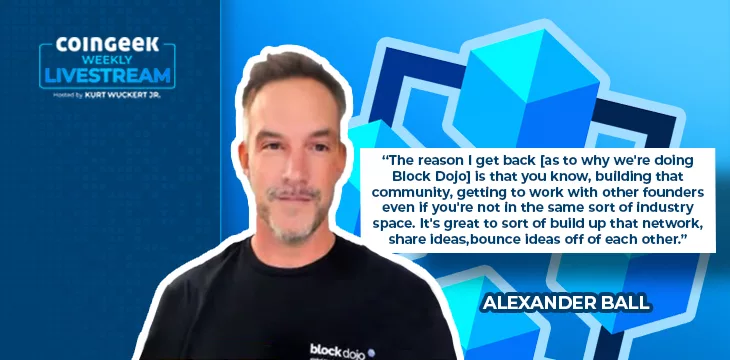|
Getting your Trinity Audio player ready...
|
Alexander Ball, Global Program Director at blockchain startup incubator Block Dojo, joined Kurt Wuckert Jr. on the CoinGeek Weekly Livestream episode 33, where he answered questions about some of the most exciting startups in the blockchain industry and talked about what it takes to succeed.
Who is Alex Ball, and what is the Block Dojo?
Ball says he has always had a passion for tech, and he worked in financial services for 20 years before co-founding the Block Dojo. Previously, he was part of a Fintech accelerator that has names like Chainalysis, Everledger, and Sparkcharge in its portfolio.
The Block Dojo deals with early-stage startups. It validates and accelerates companies, helping them connect with mentors, engage in workshops, make investor connections, and build Minimum Viable Products (MVPs). It offers £10,000 ($10,740) for 10% equity and access to its network and resources.
The firms the Block Dojo deals with are usually pre-revenue. Typically, incubators deal with companies at this stage. Accelerators come later; they help fuel the fire, growing the firm and focusing on commercialization.
At this stage on the stream, Wuckert begins to take questions from the viewers.
What are the biggest challenges you see for startups, and why should people apply to the Block Dojo?
Ball replies that one of the biggest challenges is that tech people love playing with the latest tech and creating solutions, but they don’t always have a good feel for what the market wants.
The best reason to apply to the Block Dojo is to deal with this issue—it teaches them to solve real problems, validate their ideas, etc.
What’s most important when pitching the Dojo?
Communication is the key, Ball replies. Being able to pitch properly and articulate what you’re doing is always going to help. He explains that, typically, founders pitch to an investment committee, which then asks questions. Ball says he likes to see a team consisting of a hipster, a hacker, and a hustler.
Do businesses that aren’t founded by developers have help from the Dojo in that regard?
Ball says they are very hands-on during the 12-week initial program, but eventually, they need to hire a CTO or development team to stand on their own two feet.
What stage of business will get the biggest benefit from the Dojo?
Ball says they deal with companies in different stages, but if the firm has an MVP and a solid team, they’re most likely to get some interest from the investment committee. Why is the team so important? “Ideas will change,” Ball says, but the team usually remains the same.
What happens when a project fails? Does the Dojo have rights to the product? Ball says that when it fizzles out, that’s it. They lose their investment, and they don’t have IP rights to the product or anything like that.
Why the expansion to the Philippines?
Expanding to other jurisdictions was always the plan, Ball says. They wanted to get the blueprint right first in the U.K. and then go global.
Asia was always part of that plan. In his time working in financial services, Ball realized that Asia was leapfrogging the West and leading in many areas of tech. Why the Philippines specifically? It was an emerging market experiencing six percent annual growth, has good human capital, lots of English speakers, and the president is optimistic about international business.
Are there any new Block Dojo startups we haven’t heard of that you’re excited about? Which one is the biggest game changer for blockchain?
Ball says he has a soft spot for Combat IQ, a firm focused on blockchain computer vision and fight analysis.
As for which company is the biggest game changer, he says Libraro is probably the one. It’s focused on solving a huge problem in the publishing space, dealing with the overwhelming number of manuscripts they receive.
Watch: How to build a BSV business

 08-30-2025
08-30-2025 





